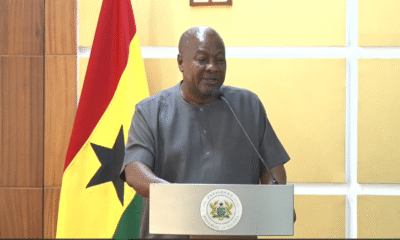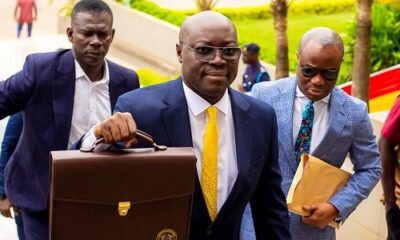News
Improve maternal care, mental health to address infertility —Health experts

Health experts have called for urgent public education, improved maternal care and mental health support to help address the medical and social impact of infertility.
Speaking at a health media training programme organised by the Merck Foundation last week in Dubai, leading specialists from across the continent called for urgent action to fight cultural stigma, improve access to reproductive healthcare, and normalise open conversations around infertility.
Dr Edem K. Hiadzi, a renowned obstetrician and gynaecologist with the Lister Hospital in Accra, highlighted reproductive tract infections as one of the major causes of infertility in women across sub-Saharan Africa.
He explained that these infections often result from Sexually Transmitted Infections (STIs), unsafe abortion practices, and post-delivery infections, which are frequently linked to untrained birth attendants or traditional healers.
“Infections acquired during unsterile procedures such as unsafe abortions or poorly managed deliveries can lead to tubal blockage and adhesions,” Dr Hiadzi said.
“Asherman’s syndrome, caused by excessive scraping of the uterine lining during dilation and curettage (D&C), is another major contributor. These are preventable conditions, yet they continue to rob many women of the ability to conceive.”
He expressed concern that a significant number of women in rural and underserved communities still deliver outside professional health facilities, increasing their risk of infections that lead to long-term complications.
“We cannot ignore the role of unskilled birth practices in perpetuating infertility. Prolonged and obstructed labour, for instance, can lead to pelvic infections, tubal damage, and obstetric fistula-some of the most devastating outcomes for any woman,” he added.
Dr Hiadzi stressed that infertility, particularly among women, is often misunderstood and leads to severe social consequences.
Supporting his call for action, Dr Francisca Bwalya, a consultant psychiatrist and Zambia’s National Mental Health Coordinator, highlighted the psychological trauma many women endure due to infertility.
Dr Bwalya warned that the emotional burden can lead to anxiety, depression, and long-lasting mental health challenges.
She called for community-based education campaigns to address behavioural practices and promote safer reproductive choices.
Dr David Mwesigye, a fertility specialist based in Kigali, Rwanda, emphasised the importance of early medical intervention.
He explained that while men can remain fertile well into old age, women’s fertility significantly declines after the age of 35.
By Esinam Jemima Kuatsinu
News
President Mahama swears in last batch of deputy ministers of state at the presidency

The President of the Republic of Ghana, His Excellency John Dramani Mahama, has sworn in four deputy minister designates at the presidency.
The deputy ministers are Dorcas Affo Toffey for Transport; James Gyakye Quayson for Foreign Affairs; Mohammed A. Sukparu for Communication, Digital Technology and Innovations; and Prof. Dr. Grace Ayensu Danquah for Health.
President Mahama administered the Oaths of Allegiance, Office and Secrecy, and presented each appointee with an instrument of office in the national colours, red, gold and green.
He noted that this final swearing-in completes the formation of his government’s ministerial team, totaling 60 appointees.
He described this as a clear sign of his commitment to a purposeful and efficient administration.
According to the President, only ministries with heavier workloads and broader responsibilities are assigned deputy ministers.
He stated that his administration is focused on achieving real results and not merely filling positions.
He urged the new deputies to work closely with their sector ministers, remain humble and serve with integrity and accountability.
President Mahama highlighted that the size of government had been reduced, and cost-saving measures such as cuts in fuel allocations and travel budgets were freeing up funds for key sectors like health, education, infrastructure and energy.
He shared encouraging signs of economic recovery, including a drop in inflation, a stronger cedi, improved GDP growth and successful payments to bondholders, students and public schools all without a supplementary budget.
The President condemned a recent incident involving the manhandling of a joy news journalist by military personnel.
He described the act as unacceptable and assured that investigations and sanctions would follow.
Speaking on behalf of the new deputy ministers, Mohammed A. Sukparu thanked the President for the opportunity to serve.
He pledged their full commitment to the President’s vision and promised they would not disappoint the Ghanaian people.
By: Jacob Aggrey
News
Government to train chiefs in Volta Region to resolve disputes and improve local governance – President Mahama

President John Dramani Mahama has announced that the Ministry of Local Government and Chieftaincy will roll out capacity building workshops to strengthen the leadership of traditional rulers in the Volta Region.
The initiative, he said, is part of a bigger plan to enhance the role of chiefs in governance, conflict resolution, and community development particularly in Volta, where chieftaincy disputes are on the rise.
According to the President, the workshops will equip chiefs and traditional council staff with the skills and knowledge to manage disputes, handle community affairs, and better understand their statutory responsibilities.
He made this known during a high-level engagement with the Volta Region House of Chiefs at the Flagstaff House.
The chiefs had raised concerns about the increasing number of unresolved chieftaincy disputes and the limited capacity of newly inaugurated traditional councils.
President Mahama acknowledged the challenges and said government would provide direct funding to support these workshops and ensure that traditional leaders in the region are empowered to function effectively.
He stressed that strengthening the institution of chieftaincy was critical to maintaining peace and stability at the community level, and would support efforts in decentralization and grassroots development.
The President also expressed hope that the ongoing constitutional review process would capture the views of traditional authorities particularly in enhancing their role in sanitation, civic education, and environmental management.
President of the Volta Region House of Chiefs, Togbe Tepre Hodo IV, welcomed the announcement and said the Volta regional house of chiefs was ready to partner with the government to resolve disputes and promote development at the local level.
By: Jacob Aggrey













